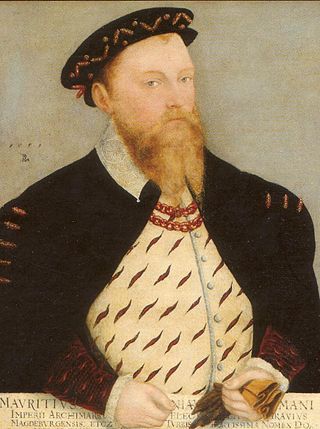Related Research Articles

The prince-electors, or electors for short, were the members of the electoral college that elected the emperor of the Holy Roman Empire.

Philip I, Landgrave of Hesse, nicknamed der Großmütige, was a German nobleman and champion of the Protestant Reformation, notable for being one of the most important of the early Protestant rulers in Germany.

Saxe-Altenburg was one of the Saxon duchies held by the Ernestine branch of the House of Wettin in present-day Thuringia. It was one of the smallest of the German states with an area of 1323 square kilometers and a population of 207,000 (1905) of whom about one fifth resided in the capital, Altenburg. The territory of the duchy consisted of two non-contiguous territories separated by land belonging to the Principality of Reuss. Its economy was based on agriculture, forestry, and small industry. The state had a constitutional monarchical form of government with a parliament composed of thirty members chosen by male taxpayers over 25 years of age.

Moritz Hauptmann, was a German music theorist, teacher and composer. His principal theoretical work is the 1853 Die Natur der Harmonie und der Metrik explores numerous topics, particular the philosophy of music.
Adolf Bernhard Philipp Reinach was a German philosopher, phenomenologist and law theorist.

Maurice was Duke (1541–47) and later Elector (1547–53) of Saxony. His clever manipulation of alliances and disputes gained the Albertine branch of the Wettin dynasty extensive lands and the electoral dignity.
Gustav Bickell was a German orientalist. He was born in Kassel, and died in Vienna.

Maurice of Hesse-Kassel, also called Maurice the Learned or Moritz, was the Landgrave of Hesse-Kassel in the Holy Roman Empire from 1592 to 1627.

The Electorate of Saxony, also known as Electoral Saxony, was a territory of the Holy Roman Empire from 1356–1806. It was centered around the cities of Dresden, Leipzig and Chemnitz.

The Bethmann family has been remarkable for the high proportion of its male members who succeeded at mercantile or financial endeavors. This family trait began in medieval northern Germany and continued with the Bethmann bank, which Johann Philipp Bethmann (1715–1793) and Simon Moritz Bethmann (1721–1782) founded in 1748 and soon catapulted into the foremost ranks of German and European banks. Even after the bank's sale in 1976, there are Bethmanns engaged in commercial real estate and forestry in the 21st century.

Philipp Christoph von Sötern was the Prince-Bishop of Speyer from 1610 to 1652 and the Archbishop-Elector of Trier from 1623 to 1652.
The County of Hanau-Münzenberg was a territory within the Holy Roman Empire. It emerged when the County of Hanau was divided in 1458, the other part being the county of Hanau-Lichtenberg. Due to common heirs, both counties were merged from 1642 to 1685 and from 1712 to 1736. In 1736 the last member of the House of Hanau died and the Landgrave of Hessen-Kassel inherited the county.
The Hessian War, in its wider sense sometimes also called the Hessian Wars (Hessenkriege), was a drawn out conflict that took place between 1567 and 1648, sometimes pursued through diplomatic means, sometimes by military force, between branches of the princely House of Hesse, particularly between the Landgraviate of Hesse-Cassel and the Landgraviate of Hesse-Darmstadt. It was triggered by a division of inheritance following the death of the last landgrave of all Hesse, Philip I in 1567.
Moritz Heuzenroeder was a pianist, composer and teacher of music born in Germany who had a substantial career in South Australia.

Werner Georg Kümmel was a German New Testament scholar and professor at the University of Marburg.

Gudenus is the name of the prominent German noble family, originated from Hesse, Germany, which can trace their ancestry up to 16th century. The family was divided into two lines. First line which held the title of Count, awarded to them on 22 October 1907, settled in Austria, while the other line of the family which held the title of Baron, granted to them on 15 April 1756, settled in Styria and Hungary.
An imperial election was held in Regensburg on 28 November 1562 to select the emperor of the Holy Roman Empire.
The Albertine branch is a German princely family of the House of Wettin. The name derives from the progenitor of the line, Albert III, Duke of Saxony. The Albertine branch ruled from 1485 to 1918 as dukes, electors and kings in Saxony.

Franz Georg Pfeiffer was a German legal scholar and politician.
References
- ↑ Herbermann, Charles, ed. (1913). . Catholic Encyclopedia . New York: Robert Appleton Company.
- ↑ https://www.genealogics.org/getperson.php?personID=I00579259&tree=LEO